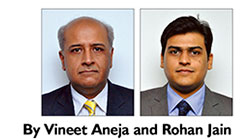 On August 11, 2015 the division bench of the Supreme Court of India overturned a full bench decision of the Gujarat High Court in the matter of Coastal Gujarat Power Limited v. Chief Controlling Revenue Authority. The judgment of the Supreme Court has far-reaching consequences, a brief analysis of which is set out herein. Facts: Coastal Gujarat Power Limited (CGPL) availed financial assistance from 13 lenders for setting up a power project. The lenders formed a consortium as a trust and executed a security trustee agreement inter se appointing the State Bank of India (SBI) as the security trustee. CGPL executed an indenture of mortgage (Deed) with the SBI, thereby mortgaging its assets and the Deed was thereafter registered with the sub-registrar Mundra, with a total stamp duty of Rs.4,21,000/-. The Chief Controlling Revenue Authority (CCRA) assessed the stamp duty liability on the Deed and raised an additional demand of Rs.50,41,000/- on CGPL. CGPL challenged the additional demand and made an application before the Gujarat High Court under Section 54(1A) of the Gujarat Stamp Act, 1958 (Act). The Gujarat High Court ruled in favour of CGPL and held that the state of Gujarat is not entitled to recover any additional stamp duty. CCRA moved the Supreme Court against the decision of the Gujarat High Court, which overturned the decision of the Gujarat High Court. CGPL arguments before the Gujarat High Court: Under law, stamp duty is leviable on an ‘instrument’ (and not on a transaction) and accordingly, in the instant case, proper stamp duty was paid on the Deed and the security trustee agreement by CGPL. It was also contended that taking aid of Section 51 of the Act cannot be construed to empower the state to levy duty on the transaction de hors the instrument. Additionally, the security trustee agreement is recognised and controlled by the provisions of the Indian Trusts Act and thus, the security trustee holds the mortgage for and on behalf of 13 lenders and such fact in itself does not fictionally create separate/distinct matters/transactions involving 13 lenders. It is also a well-settled principle that while interpreting a taxing statute capable of more than one interpretation, the interpretation in favour of the subject has to be found favour with as against the one favouring the revenue authority. CCRA arguments before the Gujarat High Court: Section 5 applies only when the instrument comprises of more than one transaction and it is immaterial whether those transactions are of the same category or of different categories. The principle that fiscal statute should be strictly construed does not rule out the application of the principle of reasonable construction. CCRA arguments before the Supreme Court: The Deed was executed as one instrument instead of several distinct instruments with the sole purpose of evading stamp duty. The instrument in question relates to several distinct matters or distinct transactions inasmuch as CGPL availed distinct loan from 13 different lenders, hence, the instrument falls under Section 5 of the Act. CGPL arguments before the Supreme Court: As no independent right was created in favour of the lenders under the Deed, it cannot be held to be a separate and distinct transaction. Assuming that the 13 lenders were seen to have an individual interest, there was in fact a commonality of such interest with all the other secured lenders and, therefore, the instrument did not deal with distinct matters. Even if a doubt arises with regard to the interpretation of the Deed and as to whether it comprises distinct matters or not, the benefit of such doubt must be given to the assessee. Supreme Court ruling: On proper construction of the Deed, it can be regarded as 13 distinct transactions, therefore the impugned order is set aside. CGPL is liable to pay deficit stamp duty together with interest. Comments: In consortium arrangement, it is general practice that the security interest is created in favour of a security trustee who holds the security in trust for the benefit of all the lenders and acts as per their instructions. Creation of security interest in favour of a single entity has multiple benefits such as: ease of assignment; being cost effective; and ease of enforcement. The ruling not only affects the consortium arrangement, but has the potential to thwart the structuring of debt issue, wherein there are multiple subscribers and a debenture trustee is appointed to protect their interest. –––––– |
Clasis Law
14th Floor, Dr Gopal Das Bhawan,
28, Barakhamba Road, New Delhi 110 001, India
Tel: (91) 11 4213 0000 / Fax: (91) 11 4213 0099
Email: vineet.aneja@clasislaw.com
pratyush.khurana@clasislaw.com
Website: www.clasislaw.com































